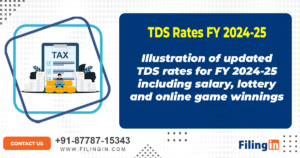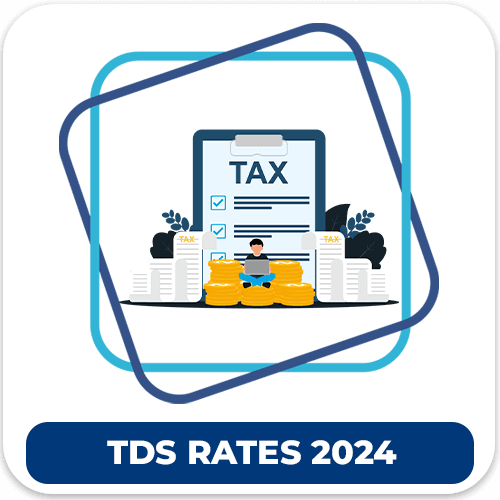The Central Board of Direct Taxes (CBDT) has rolled out significant updates for Tax Deducted at Source (TDS) rates, which will be applicable in the financial year 2024-25 and the corresponding assessment year 2025-26. These adjustments, introduced through the Finance (No. 2) Act, 2024, bring changes across various income categories such as salary, interest from securities, winnings from lotteries, and more.
In this article, we will dive into the revised TDS rates, helping taxpayers and businesses better understand their obligations. Whether you’re a salaried individual, contractor, or someone dealing with virtual digital assets, these changes impact you. So, let’s get started.

What is TDS?
TDS, or Tax Deducted at Source, is a mechanism by which a certain percentage of tax is withheld by the payer before the payment is made to the payee. This system ensures a steady inflow of revenue for the government throughout the year.
Key Highlights of the Revised TDS Rates for FY 2024-25
The new TDS rates introduced by the CBDT are designed to streamline the tax process and ensure efficient collection. Below are the primary updates you need to know:
1. Payment of Salary (Section 192)
For salaried individuals, the TDS on salary payments will be deducted according to the applicable income tax slab rates. This ensures that salaried individuals are taxed in line with their overall income, as per the prevailing tax structure.
2. Winnings from Online Games (Section 194BA)
TDS on winnings from online games remains at 30%. This rate applies irrespective of the prize amount, making it a consistent taxation policy for gamers. Whether you win a small prize or a jackpot, 30% TDS will be deducted.
3. Interest on Securities (Section 193)
For those earning interest on securities like debentures, government bonds, or other forms of securities, the TDS rate has been set at 10%. This rate continues to simplify tax deductions for individuals and entities earning passive income from such investments.
4. Contract Payments (Section 194C)
If you are an individual or Hindu Undivided Family (HUF) contractor, the TDS rate stands at 1%. For others, a 2% TDS will be deducted. This differentiation ensures fairness in the taxation process, providing clarity for contractors.
5. Winnings from Lotteries (Section 194B)
TDS on winnings from lotteries, crossword puzzles, and similar games remains at a flat 30%. This is consistent with the previous tax structure and applies regardless of the size of the winnings.
6. Virtual Digital Assets (VDAs)
With the growing popularity of virtual digital assets (VDAs), the government has made changes to their taxation. Specific rates for TDS on transactions involving VDAs ensure that digital currencies and tokens are taxed efficiently.
7. Life Insurance Policies (Section 194DA)
Starting from October 1, 2024, the TDS on life insurance payouts has been reduced to 2%, a drop from the previous rate. This change provides relief to individuals receiving payouts from life insurance policies.
8. Commission Payments
For those earning commissions, the TDS structure remains similar to previous years. However, new thresholds and rates have been clarified to ensure that individuals receiving commissions are taxed appropriately.
9. Rent Payments (Section 194I)
Rent payments continue to attract TDS, with specific rates depending on the type of property. For land, building, or furniture, the TDS rate is 10%. For machinery or equipment rentals, the TDS is 2%.
10. Professional Fees (Section 194J)
Professional services, including technical and consultancy fees, will continue to be taxed at 10% TDS. This remains consistent, ensuring professionals are taxed fairly while ensuring compliance with the tax regulations.
11. Royalty Payments
For royalty payments, the TDS remains at 10%, keeping the taxation system consistent for creators and rights holders. This ensures that intellectual property earnings are properly accounted for.
12. Payments to Non-Residents (Section 195)
For payments made to non-residents, the TDS rates vary depending on the nature of the payment. It’s essential for businesses and individuals dealing with foreign entities to ensure they are aware of the specific rates applicable to their transactions.
13. TDS on Dividends (Section 194)
Dividends from shares continue to attract TDS at 10%, offering consistency in the taxation of passive income from investments. This ensures that shareholders contribute to the tax pool.
14. Payments for Technical Services (Section 194J)
TDS on payments for technical services remains at 10%, ensuring that payments to IT professionals and similar service providers are in line with the country’s taxation system.
15. Reduced Compliance for Small Taxpayers
In addition to these updates, the government has introduced measures to simplify compliance for small taxpayers. By streamlining filing requirements and offering digital services, the overall process has become more efficient.
Impact of the Revised TDS Rates
These new TDS rates aim to improve tax collection efficiency while providing clarity for taxpayers. Whether you are a salaried employee, a contractor, or an investor, these rates ensure that taxes are deducted accurately at the source, minimizing the chances of evasion or delay.
The reduction in TDS for life insurance payouts is a notable relief for many policyholders, making the taxation process more equitable. Similarly, the consistent rates for winnings from lotteries and online games offer transparency and fairness.
How to Stay Compliant with TDS Changes
To stay compliant with the new TDS rates:
- Ensure that your employer or payer deducts the correct TDS based on your income category.
- For businesses, review the updated rates and apply them when making payments to contractors, professionals, or non-residents.
- Use digital tools and services provided by the CBDT to streamline TDS filing and compliance.
Conclusion
The updated TDS rates for FY 2024-25 reflect the government’s efforts to simplify the taxation process while ensuring efficient tax collection. By staying informed and compliant with these changes, taxpayers can avoid penalties and ensure smooth financial planning.
The future of taxation is evolving, and staying on top of these updates is essential for both individuals and businesses. Whether you’re earning from salary, contracts, or even digital assets, these changes will impact you in the year ahead.
Frequently Asked Questions (FAQs)
1. What are the new TDS rates for online game winnings?
TDS on online game winnings remains at 30%, regardless of the prize amount.
2. Has the TDS rate on life insurance payouts changed?
Yes, starting October 1, 2024, the TDS rate on life insurance payouts has been reduced to 2%.
3. Are there any changes to TDS on salary payments?
No, TDS on salary will continue to be deducted according to the prevailing income tax slab rates.
4. What is the TDS rate for interest on securities?
The TDS rate for interest on securities such as debentures and government bonds is set at 10%.
5. How does TDS apply to virtual digital assets (VDAs)?
TDS rates for VDAs have been introduced to ensure proper taxation of digital asset transactions.

